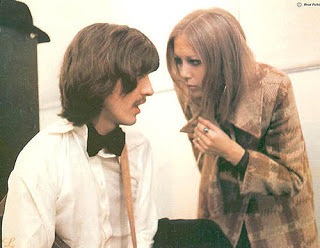- Bring on the Lucie by Hallelujah the Hills - October 9, 2015
- Experiment: Two Words - July 27, 2013
- POV - July 19, 2013
1. There’s a whole blog devoted to Pattie Boyd: Swingin’ Pattie. [Update Dec 2014: Sorry, there USED to be. It’s defunct.]

2. From an interview with Fred Armisen by Damian Rogers (on the Believer tumblr):
FA: I had to take all these tests with questions like, Do you see animals other people don’t seem to see? Do you feel a tight band wrapped around your head? It was very embarrassing for me, you know what I mean? No kid wants to go into some room with a psychologist while everyone else is having their day at school. It made me feel very alone. I was just being funny — it wasn’t real. Then hearing John Waters talk about shocking people made me feel like, Oh, there’s a grown-up who’s doing the same thing. So I went to the mall and I bought [John Waters’s] Shock Value and I read the whole thing, cover to cover. And that brought it to another level, because it’s all about the reaction he wants to get from his audience — and by the way, I didn’t read any-thing then, ever. I wasn’t a reader. I didn’t care about literature. I’d read maybe a couple photo books on The Beatles, that’s it. But that book was everything I believed in, and I didn’t even know it yet. The book opens with a line like, “If someone in my audience throws up, it’s like getting a standing ovation.” So I wrote to him. And the way I wrote to him is: he says that he stays with his friend Cookie Mueller—









The Fred Armisen interview is really interesting, because it highlights a huge shift in popular culture since 1980–basically, the idea that knowing mimicry is the same as genuine artistic POV, and being famous is a worthy and laudable goal.
John Waters (b. 1946) has had basically two stages to his career: the early, interesting part where he did exactly as he pleased with no corporate involvement whatever, and filmed some genuinely shocking things (go watch Divine eat dogshit if you don’t believe me). This was followed by the later part when he’s been famous mostly for being John Waters. Basically an extended cash-in, made more palatable by his good-humored knowingness about it, and the fact that he’s genuinely an interesting breed of cat. There’s only one John Waters–but you can only tell that from Flamingos, Female Trouble, and Polyester.
Fred Armisen (b. 1966), whose work I like, proves that any reasonably determined person can learn how to do comedy and–if you’re willing to create material within certain proscribed limits–get sorta famous.
What Portlandia demonstrates with every episode is 30 years’ worth of comedy people content to do only half the job. They observe exquisitely well, but they refuse to make any clear judgments, and it’s that second half–the judgment half–where the laurels get won. Imagine “The Great Dictator” without judgments; or “M*A*S*H.” Or heck, SNL circa 1977.
What is Portlandia saying about Portland, or hipster culture, or America? Nothing really, and there’s a reason for that: if you judge something, you might piss somebody off, and that doesn’t help you get famous. In fact, it hurts you.
Say Portlandia really celebrated hipster culture–thought that it was better–what would IFC say? “The only people who’ll like this are hipsters. That’s too small a demo.” Or what if it really lampooned it, really took it down? That wouldn’t be good, either: “This is going to piss people off–no thanks.”
Here’s my point: John Waters is only worth paying attention to BECAUSE of the years he didn’t give a shit about corporate, middlebrow media; “Hairspray” only entertains because of the camp associations of Waters’ earlier work; without that, it’s to comedy what Roger Corman was to monster movies.
Armisen and the rest of his ilk jump to Hairspray-era Waters without going through the earlier stage–and end up creating stuff that seems satirical because it’s well-observed, but doesn’t actually say anything. It’s the comedy version of a grocery-store tomato: looks good, but doesn’t taste like anything…which is exactly what corporations prefer.
Contrast: The Beatles. Their version of “giving the corporation what it wants”: The Decca Audition. And if that’s all they’d done, we wouldn’t be talking about them.
Does Fred Armisen have a Pink Flamingoes (or “She Loves You”) inside of him? I genuinely hope so; but the prejudices of his generation push him away from art and towards content, just like the prejudices of Waters’ generation did the opposite…in part because The Beatles showed them it could–and SHOULD–be done.
mike, that’s the most important thing I’ve read on this blog in a long time. and it’s not even about the beatles.
I for one would like to know when mimicry became art, and outright aping became an acceptable substitute for actual influence.
Thanks, Anon. I wasn’t sure if I should post it. I’m so out-of-step with current comedy, and always feel like a dog in the manger talking about it. But I was on the roof reading a book about World War I, and came down thinking I should write an essay about parody and why it’s so important today–how it is THE battleground, just like obscenity seemed to be in the days of Lenny Bruce–then read Ed’s post, and that came out.
So I’m very glad it struck a chord.
Shooting from the hip: in comedy, I think mimicry became art when pop culture became fragmented, PC upped the penalty for certain kinds of mistakes, and the media corporations relaxed their stance on obscenity. So the consequences for the audience disagreeing with you increased, at the same time an utterly safe area that seemed edgy was offered.
Comedy that is located in something deeper than commonplaces is really tough; it’s a huge risk–“Are you with me on this? Am I being a buzzkill? Are you offended?” If you can talk about your five-year-old daughter’s vagina, it’s simply a lot easier; it activates taboo laughs, still feels edgy…and yet says nothing.
I love Portlandia’s lesbian bookstore couple, but I keep expecting the writing to actually say something about the culture they’re displaying. What do you think about these characters, Fred and Carrie? Just that they exist isn’t really enough. Making something the subject of a sketch is only important if you think life isn’t real unless it’s on TV…And that idea is truly worthy of comedy, but it wouldn’t ever be aired, because it corrodes the commercial assumptions underpinning TV. And what does it mean to hand over our culture to for-profit enterprises? That’s also worthy of comedy, but…your five-year-old daughter’s vagina is so much FUNNIER, isn’t it?
Maybe it is, but after 30 years, I want something more.
family guy.
seth mcfarlane observed the “aha” power of the reference and decided an entire show comprised of it would be wildly popular. he was right.
the show is like a quick shot of oxytocin; an empty prompt that strikes a deep emotional response (empathy). and when it’s over, it’s like having eaten candy instead of dinner.
I feel like this model applies to many things (see the neo-newage “chillwave” music coming out of brooklyn), but your field in particular has been hit really hard.
and it’s like… way off topic.
Agreed. You all aren’t the only ones who feel this way.
Back on topic… I only recently discovered the small cluster of people who fervently believe that leaving Patti was the worst thing George ever did. And I mean fervently, as in going so far as to leave crazy “reviews” of Material World on Amazon claiming stuff like Olivia “couldn’t even speak English” when he met her.
Note to all: when big rich rock stars escape your idea of the way you think they should be living their lives, it’s probably for the better.
Anon, Family Guy started as a symptom, not a cause–its relationship to The Simpsons is like that of Porky’s to Animal House: a corporate, blander, but still adequate version of an wildly successful surprise. Now FG is a cause, as the next generation trains itself to copy what is successful. That’s how this attenuation works, and why cranks like me need to say what I’m saying.
Within the business–or at least the portions I circulate in–FG is considered to be a rip-off of The Simpsons which uses a very lazy kind of humor. It’s successful, and that’s respected, but not artistically very interesting. But it must be said that 99% of the people in the world, and even most of them in the comedy biz, could give a shit. To the first group, it’s entertainment; to the second, it’s just business. Caring more than that is setting oneself up for a life of frustration, but some of us can’t help it.
The authentic stuff always requires a lot of timing and luck to happen, whether it’s The Beatles or John Waters (and the midnight movie phenomenon) or The Simpsons. All three were totally unexpected and fan-driven. Then, once that authentic stuff happens, the corporations set to work standardizing spin-offs, increasing predictability and reducing risk. It creates things that look and feel somewhat like the original, but without its idiosyncracies, personality, and artistic content. Reproducible, low-risk, profitable content is the aim of corporate media; art is not.
There’s nothing wrong with this if the people on the artistic side remain subversive, if they sneak in what they want to say. Where it’s gone wrong is that–in all pop cultural fields–creatives are less and less willing to take that risk because they know that doing so will reduce their chances of becoming successful in a field that is more competitive than ever before, offering greater rewards than ever before. As a result, pop culture increasingly selects for people whose main goal is to be rich and famous, not expressing one’s own special weirdness. That’s the difference between Waters and Armisen.
Here’s why it’s not off-topic, and worth talking about: because post-Pepper pop culture needs to aggrandize itself to reach total saturation, anybody mega-successful is immediately granted Great Artist license–when it’s more likely that their not being artistically ambitious is what made them so successful. Success in popular culture requires one to be distributed by the big machines, and that happens one of two ways: you do your thing, and through word of mouth and luck, you get enough attention that the big machines think they can make money off you; or you purposely create something as close to what the big machines are already putting out, but with a slight demographic, economic, or cultural difference so that the big machines can colonize a new market. Not for nothing is Family Guy set in New England; even clearer is how Portlandia targets hipster culture.
Authentic artists are rare in pop culture, and precious; they’re the ones that really move us forward. And so as appreciators we need to be able to recognize the real innovators from the Genius of the Moment; and encourage the innovators to keep risking. Think: What would’ve happened to The Beatles if Pepper had failed?
Whatever you think of John Waters, he certainly had something unique to say, and said it with no regard to “the market.” As much as Fred and Carrie make me laugh, I don’t get the same sense from them. Until they show that courage, what they create will be of the second rank. Same goes for Seth McFarlane. There’s a reason Salieri was worth more than Mozart.
“when big rich rock stars escape your idea of the way you think they should be living their lives, it’s probably for the better.”
AMEN!
And now we have THREE shows devoted to “discovering” people who fit commercial requirements for pop music (“American Idol,” “The Voice,” and “The X Factor”). Not to mention the myriad of other reality shows that reinforce the idea that, as Michael put it, “being famous is a worthy and laudable goal,” even if there’s no content to that fame. And we get comedy without real risk and without real punch.
There’s some consolation in realizing that the real stuff does last and continues to speak. My kids, for example, love “The Simpsons” as they don’t love a lot of what’s being put out for their demographic today.